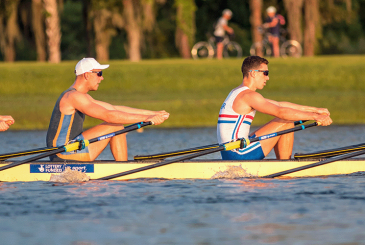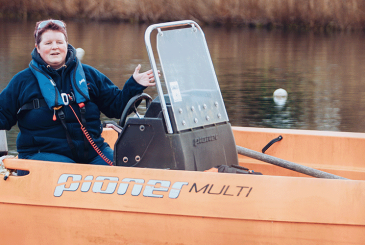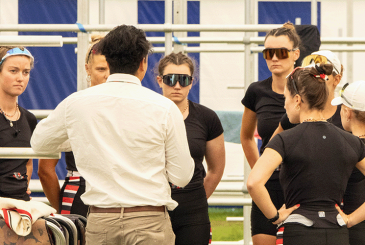What is the essence of coaching? Jesus College Head Coach Jonathan Conder, a newly qualified L4 coach, shares his thoughts
Jonathan Conder is one of only around 20 rowing coaches in the country to have achieved a Level 4 coaching qualification. “I strongly believe in the principles of coaching personal development (CPD) and trying to expand your knowledge,” says the Head Coach at Jesus College, Cambridge.
“There were aspects of coaching rowing that I wanted to explore in detail, but while holding down a full-time job and raising a family, I’d never been able to get to grips with it. I felt the Level 4 qualification would give me the opportunity to do that.”
Around three-quarters of the qualification consists of a postgraduate diploma in Professional Practice in Sports Coaching delivered over two years by the University of Gloucestershire. To achieve the L4, this is combined with a wrap-around element delivered by British Rowing, which includes a 360-degree review involving feedback from athletes and other coaches, as well as a coaching log and assessments.
Jonathan’s years of experience in the sport meant he easily met the entry criteria. He started rowing while at school and later rowed for Molesey BC and Cambridge ’99 RC, before moving into coaching and eventually working with Cambridge ’99, the Cambridge University Women’s Boat Club, and as a coach educator for British Rowing. After a career in the aerospace and defence industry, he wanted a change in lifestyle and took the opportunity to coach full time at Jesus in 2017.

“When I joined, I asked if they would be willing to support me to complete the L4 qualification and they kindly agreed.
“It’s significantly different to the coach education you do on the way up, which is very much about rowing technique, warming up, rigging boats, and writing training plans. A lot of people think a Level 4 course will be enhanced versions of that – even better training plans, and even better rowing technique. But it’s much more philosophical and gets you to really think about coaching in the broader sense.”
It may also come as a surprise to many that the Gloucester course is shared with British Equestrian. “Their frame of reference is totally different, so it moves the conversation away from just talking about rowing. I think that was a really clever thing to do.”
As part of the qualification, he designed a research project that compared traditional coaching with an approach in which rowers themselves are given more agency.
“Humans are self-organising and will find a solution to a movement problem and coaches need to create the right environment”
“I had a bit of an existential crisis as a coach and was wondering if we’re getting the dynamic right between athlete and coach. In particular, I was interested in whether there might be an alternative to the traditional, coach-centric, instructive approach.
“If you ever Google ‘rowing coaching’, lots of images come up of people shouting through megaphones and, to some extent, it’s true. It’s a very ‘I’m going to tell you what to do,’ approach, and that’s sort of expected by athletes.
“We set up some equipment on the rowing machine to measure the distribution of forces between the footplate and the handle, and analysed the force profile of some good rowers,” he explains. “Then we engaged some beginner rowers and asked if they could coach themselves towards this distribution of force using a computer-generated visual and audio feedback system.

“We found this self-coaching was much, much more effective than traditional coaching. They’d spend a few minutes figuring it out and gradually they’d tune themselves in and the number of strokes they’d miss would get fewer and fewer. Fundamentally, we’re wasting our time telling people what to do, when what we should be doing is finding ways for them to figure it out for themselves.”
The more theoretical side of the qualification dovetailed nicely with his own research findings, he adds, particularly when it came to ecological dynamics and the constraints-led approach to coaching. Essentially, this says that humans are self-organising and will find a solution to a movement problem and coaches need to create the right environment for this to happen.
“That’s what I was doing, but I hadn’t joined up the dots. It gave my research a nice academic framework,” he says. The diploma is equivalent to four out of the five modules required for a master’s degree, and he is now taking the idea forward and looking at the motor skills used in rowing for his MSc, which he will complete this summer.

“It’s been quite profound for me and led to a fundamental change in my coaching philosophy and methodology.
“When I look at a rower, I’m now thinking about what they’re learning. A lot of the time, they’re just going through the motions, so what am I going to do to change things and afford a learning opportunity?
“For example, I can make them row square blades or I can make them row with their eyes closed. There’s a whole bunch of things I can do that will change the learning. It makes the sessions much more enjoyable for them as they’re constantly being challenged.”
British Rowing’s Level 4 qualification
Find out more about the Level 4 coaching qualification here. The next Advanced Coach Induction Day on the 20th of May is free to attend and is open for bookings, please find full details here.










